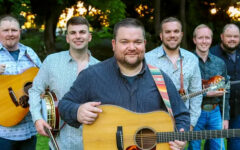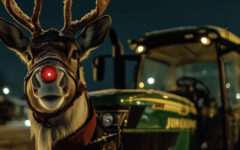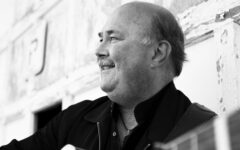
Marty Raybon will be releasing two new CDs later this month. The Grass I Grew Up On is a bluegrass CD and When The Sand Runs Out will be simultaneously released as a country project. Singles from both projects have already been released to radio. I had the chance to converse with Marty about these projects recently and ask him a few questions. My concern was mainly with the bluegrass project, but we did discuss the country release some as well. Here’s the interview.
Marty can you tell me about the players on this CD? Who they are, and why you wanted them involved in this project?
Well, the band that I had together at the time of the first initial recording was Patton Wages on banjo, and after having a baby, he decided to stay at home and has gone to work land surveyin’. Patton played banjo on all of the cuts except for Tall And Tough, the Paul Williams number from the album. I replaced him with a young man by the name of Derrick Dillman who played with Mr. Good ‘N Country, Jimmy Martin and he was one of the Sunny Mountain boys the last 4 years of Jimmy’s life. He has the attitude to work and the willingness to play it right. I felt like it was essential to have Derrick be apart of this album. When you feel a part of something then you become one of the guys and that is very important to me.
Ashby Frank in my best definition is one of the finest mandolin players and stylists this music has ever known. Shane Blackwell plays all the lead guitar work and is an individual, because of his character, that anybody would want workin’ for him.
Edgar Loudermilk is a fine young man. He is very enthusiastic and cares about his job a great deal. What I truly personally enjoy about Edgar is that he is a people person, a bass player and a tenor singer.
Glen Harrell played some of the finest twin fiddle work that I have ever heard. He has a knack to find the right part to play and what makes his playin’ so well, is he knows when to play and when not to. That is a very wonderful trait for a musician to have.
Andy Hall helped out on the dobro and done an absolutely fine job on the Pete Goble and Leroy Drums “Dixie In My Eye”.
This album is an attempt to prove my heart and the love that I have for music is bluegrass. I decided to get back into bluegrass music because of the fellowship with the fans and the pickers. My goal, which is definitely a labor of love, is to do everything that I absolutely can to bring this music and the approach and the vision to as many people as I possibly can. To quote Helen Keller, when asked what would be worse than being blind, she said “to have sight with no vision”.
Let’s discuss the songs on this project. How did you go about choosing the material? Do you have a favorite? And if so, what is it about that particular song that you like?
“Highway Headed South To Dixie” was penned by Porter Wagoner. I fell in love with Porter the day he had Lester Flatt and Earl Scruggs on his TV show. Then later on the Osborne Brothers cut that and I always loved it. And I just felt like that as the album title says, this was the grass I grew up on. It was just another one of those tunes that while being around the house and playin” the bluegrass festivals throughout the southeastern part of the US, my brothers Ricky, Timmy, my Dad Kenny Buck and Ron Rimmer and I grew up on. “I Can”t Even Walk Without You Holding My Hand” is more of a statement of my faith in Jesus Christ and to prove how inadequate I am without the Lord to hold on to. “Alone With You” was a tune written by Faron Young which he had a big hit with. But I was introduced to the song by Jim and Jesse on their “Superior Sounds Of Bluegrass” album. And from the time that album came out, I”ve been doin” that song ever since. At a bluegrass festival in Lawtey, FL in 1974 a group from Shelby, NC came and played. They were introduced as the Bluegrass Tarheels. Their second song was entitled “The Water So Cold” wrote by Harlan Howard. I was really taken by the Tarheels because it was the first organized bluegrass band that I had ever seen that really moved me with a song. On the bill at Lawtey that same weekend was Jim and Jesse, Bill Monroe, The Lewis Family, The Sullivan Family, James Monroe and Jimmy Martin and The Sunny Mountain Boys. The Bluegrass Tarheels were the only act on that show that was not a headliner. Although to me that weekend in every sense, they were. James Randolph and Robert McDoogle. And of course Robert played the mandolin and sang tenor, James Randolph played guitar and sang lead, Jerry Edmondson played banjo and sang baritone. Doyle Donahue played fiddle and they stole the crowd. “The Water So Cold” was one of the tunes that I can recall so clearly. Plus I bought the record that had it on it. Ha Ha. “The Nerve” is a tune that tells a story in a unique way that only Bobby Braddock could write. He talks of love and how it came to be. It is definitely one of my favorites on this project. “Standin” Tall And Tough” was given to me at the very last IBMA week in Louisville, KY in 2004. Paul Williams and I stood outside the music auditorium and he sang the words to me. And of course bein” such a Paul Williams fan and as such a contribution of talent that he gave to Jimmy Martin, I truly believe drew me to the song even that much more. And I feel honored that Paul would want me to record one of his songs. I am truly a fan. The quartet numbers on the album, “The Home Above” written by Bill Monroe exudes the love of quartet singin”. Our arrangement on this project is somewhat different but I assure you the love for it isn”t. And those are really probably my favorites on the album.
How do you go about working up arrangements for the tunes? Do you know what you want in your head before you start working with the band or do they have some input on the arrangement?
It”s a democratic system. I truly believe to be a good boss is to be a good listener. Opinions are very valuable and what I”ve found, is the right ones and the wrong ones are always good. Because they lead you and keep the creative juices stirring. The guys I work with want this thing to work as much as I do. And I believe in them, and their ability, enough to never try to hinder them but to help create the sound that we”ve put together for the last 4 years.
I noticed on your site that you have two samples of the tune Shenandoah Saturday Night, one country, the other bluegrass. What caused you to produce it this way? Were they produced at the same time for the two different albums? That must be demanding to produce two CDs simultaneously, what inspired you to undertake that?
The biggest undertaking this year has been to record two albums simultaneously. One with just a little bit different approach because of the pursuit of expansion. To put “Shenadoah Saturday Night” out in the mainstream, to build audiences, would have to be instrumentally different. And the reason for recording it Bluegrass would be to convince Bluegrass lovers that I have no intention of ever abandoning the music that I truly love in my soul. “The Grass I Grew Up On” is a gathering of material that I’d done as a boy growin’ up. And to find myself some years later in mainstream country music was to present something that I will never be able to get away from. I will always be known as the guy that sang the hits of Shenandoah. Being in the studio listening to the magic, having the feeling you get, when a song moves you like it will, I feel is just as much a part of living and creating what your heart feels.
Any interesting story from the recording/production process that you want to share?
Actually it was truly all business. Usually the guys that have a lot of humor took what they were doing very seriously and I thought that was very professional of them. They don”t claim to be studio musicians but they know the importance and believe in the vision.
How do you feel about this project overall in the sense of it’s strength as a representation of what you do? Are you pleased with it?
I truly believe that when someone tries to perfect a craft it is a never ending battle to try to do better than what you did before. But at times to try to be a good producer you have to realize when the magic is there. And that is when you quit. This music in it’s rawest form with flaws and flat notes has been what has made it since the beginning of its existence.







